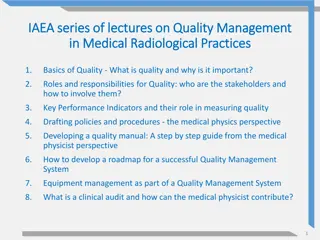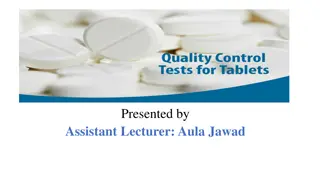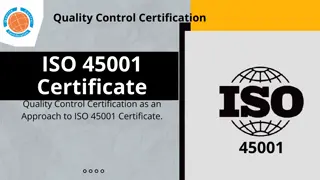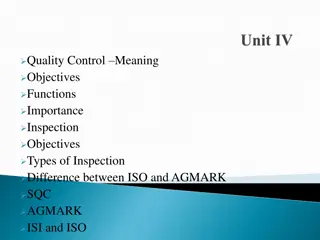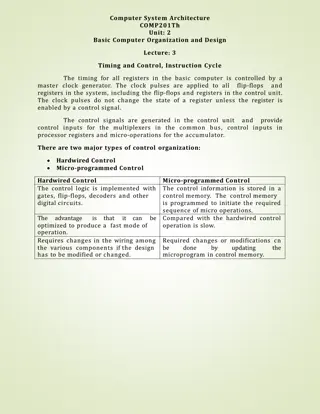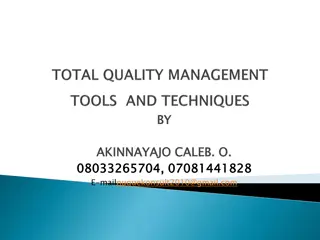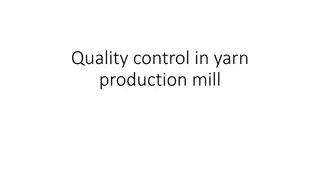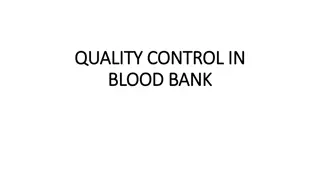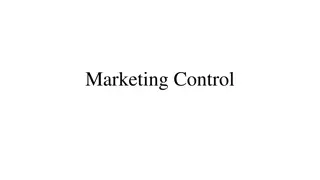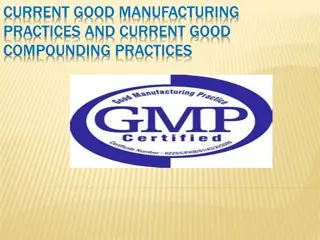
Quality Control in Different Industries
Quality control plays a crucial role in ensuring products meet standards. Explore the goals, types, methods, and factors of quality control in various industries like food, drugs, education, and more. Learn how investing in quality control measures can enhance a company's reputation and reliability.
Download Presentation

Please find below an Image/Link to download the presentation.
The content on the website is provided AS IS for your information and personal use only. It may not be sold, licensed, or shared on other websites without obtaining consent from the author. If you encounter any issues during the download, it is possible that the publisher has removed the file from their server.
You are allowed to download the files provided on this website for personal or commercial use, subject to the condition that they are used lawfully. All files are the property of their respective owners.
The content on the website is provided AS IS for your information and personal use only. It may not be sold, licensed, or shared on other websites without obtaining consent from the author.
E N D
Presentation Transcript
Dr Digvijay Sharma School of Health Sciences
Quality Control Quality does not have a singular definition. Despite the relative meaning of value, quality control is the process by which products/services are tested and measured to ensure they meet a standard. Through this process, a business can evaluate, maintain, and improve product quality.
goals of quality control There are two crucial : (1) to ensure that products are as uniform as possible. (2) to minimize errors and inconsistencies within them.
Types of Quality Control Just as quality is a relative word with many interpretations, quality control itself doesn t have a uniform, universal process. Some methods depend on the industry. Take food and drug products, for instance, where errors can put people at risk and create significant liability. These industries may rely more heavily on scientific measures, whereas others (such as education or coaching) may require a more holistic, qualitative method. At its core, quality control requires attention to detail and research methodology.
Quality control methods There are awide range of quality control, including: Control Charts: A graph or chart is used to study how processes are changing over time. Using statistics, the business and manufacturing processes are analyzed for being in control. Process Control: Processes are monitored and adjusted to ensure quality and improve performance. This is typically a technical process using feedback loops, industrial-level controls, and chemical processes to achieve consistency. Acceptance Sampling: A statistical measure is used to determine if a batch or sample of products meets the overall manufacturing standard. Process Protocol: A mapping methodology that improves the design and implementation processes by creating evaluative indicators for each step.
Other quality control factors There are other quality control factors to consider when selecting a method in addition to types of processes. Some companies establish internal quality control divisions when defining what is quality control. They do this to monitor products and services, while others rely on external bodies to track products and performance. These controls may be largely dependent on the industry of the business. Due to the strict nature of food inspections, for example, it may be in a company s best interest to sample products internally and verify these results in a third-party lab.
Importance of quality control In the long run, investments in quality control measures can protect the reputation of a company, prevent products from being unreliable, and increase trust on the side of consumers. These processes are determined through rigorous methodology and testing, as well as industry standards and best practices. Moreover, quality control is necessary because it ensures that a company will look at evidence-based data and research not just anecdotal observations to ensure that products are living up to their standard. One essential aspect of quality control is that the process doesn t just happen once but is a routine evaluation of the product to ensure that it s continuously meeting both the manufacturing standards and consumer demand. No consumer wants to risk using a product that could endanger them or fail expectations. A company s reputation, reliability, and efficiency are all at risk if quality control is overlooked. A product s testing can play a role in marketing and sales as well since consumers may trust it more.
Quality Control Roles and Responsibilities When answering what is quality control, it is critical to understand that it consists of multifaceted responsibilities and roles. Moreover, it shouldn t be confused with quality assurance. Whereas quality assurance looks at the processes used to prevent defects, quality control is focused specifically on the measurement and analysis processes involved with determining product quality. Quality control uses specific research tools to accomplish fact- finding processes and conduct analyses. A quality control professional is tasked with analyzing these measurements against some sort of standard determined by the quality management department, company policies, and industries or regulatory bodies. Based on this evidence-gathering, quality control will recommend changes.
Difference between quality assurance and quality control We can see from this roadmap, too, how quality assurance and quality control differ. Quality assurance looks at the holistic picture to prevent a product from becoming defective. Quality control, on the other hand, later determines if a product is, in fact, defective or not. Both roles fit under the broad umbrella of quality management. Thus, an individual in quality control is tasked with communicating results to stakeholders and significant parties. A good quality control specialist will be able to disseminate scientific and research-based thinking to a business community and assist with the problem-solving process. These specialists are a key component of a product s design process, as they determine whether a company s creation is truly acceptable for the market.
Refrences https://www.simplilearn.com/what-is-quality-control- article


